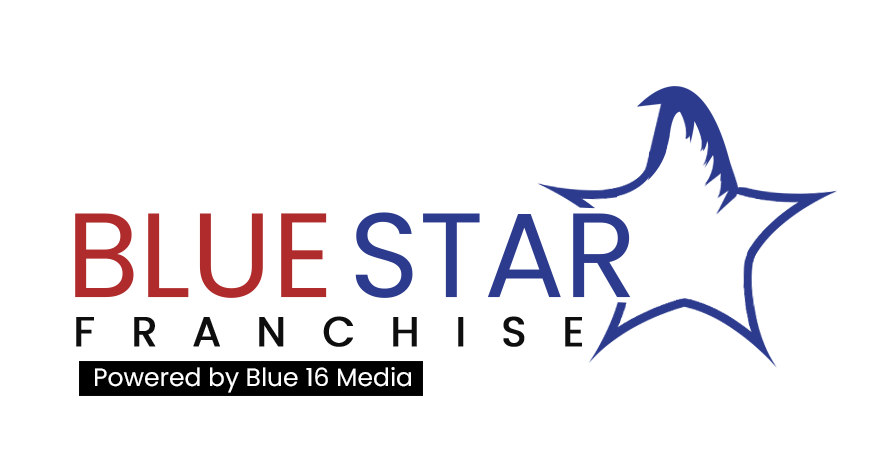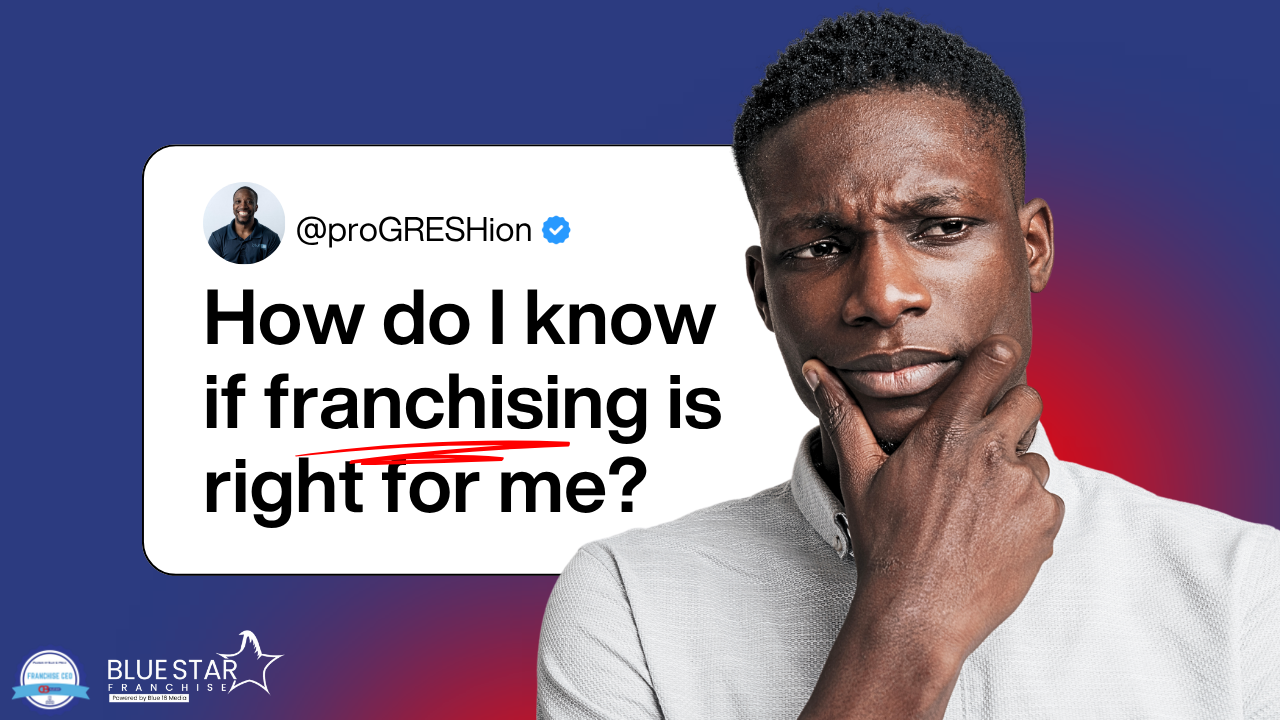Entrepreneurship is often painted with a broad brush, but the truth is, it’s far from one-size-fits-all. This insight struck me early on during my sales training days at Yellowbook, which later became Hibu (literally while we were in training). My trainer used to say, “I don’t fit everyone. I’m not a onesie. Not everybody’s cup of tea.” At the time, it sounded like a quirky phrase, but looking back, it perfectly encapsulates the entrepreneurial journey, especially when considering franchising as a path to business ownership.
My name is Gresh, and I’m your connection broker. I host the I Am CEO podcast, and I’m the founder of Blue 16 Media and Blue Star Franchise. Over the years, I’ve created thousands of pieces of content—over 1,600 podcasts, 6,000 blog posts, and hundreds of videos—all designed to help entrepreneurs, CEOs, and business owners succeed.
View this post on Instagram
Through these efforts, I’ve learned that the key to success is finding the right fit for your unique style and goals. One of the options I often discuss with aspiring business owners is franchising. But is franchising right for you? Let’s dive in.
Understanding What a Franchise Really Is
At its core, a franchise is a business model where you buy into a system that already works. Instead of building something entirely from scratch, you invest in an established brand, complete with training, proven processes, and a detailed playbook designed to help you succeed. This means you’re still the business owner, but you’re not alone in navigating the challenges of entrepreneurship.
Think of franchising like sports. Not everyone wants to be the general manager or head coach. Some people prefer to get in the game, run the plays, and focus on execution—whether that’s scoring, passing, or shooting half-court shots like Steph Curry. A good franchise offers that playbook and a support team, so you can hit the ground running.
If you’ve ever watched The Founder on Netflix, you’ve seen how McDonald’s grew by replicating systems effectively. That’s the power of franchising: a replicable system that, when done right, can scale and succeed across markets.
Who Should Consider Franchising?
Franchising is an excellent fit for certain types of people. Typically, those who are:
- Coachable: Willing to learn and follow established systems.
- Action-oriented: Ready to take decisive steps and implement strategies.
- Comfortable within structures: Able to work within a framework rather than create everything from scratch.
Franchises exist across nearly every industry imaginable—food, fitness, home services, car repair, B2B marketing, and more. At Blue Star Franchise, we help match aspiring entrepreneurs with franchises they may never have known existed. We maintain a deep inventory of over 800 concepts across close to 40 different verticals, so there’s something for nearly every interest and skill set.
Different Types of Franchises
It’s important to note that franchising isn’t a monolith. There are emerging brands and well-established brands and everything in between, each with different levels of entrepreneurial freedom and risk.
- Emerging Brands: These may offer more flexibility and room for innovation, appealing to entrepreneurial spirits who want to be part of a growing concept.
- Established Brands: These tend to have more rigid systems and proven track records, which might not be ideal for someone wanting full creative control but offer stability and predictability.
Your personality, goals, and stage in your career will influence which type of franchise is the right fit for you.
Is Franchising Right for You? Key Considerations
While franchising offers a lot of advantages, it’s not for everyone. Here are some important factors to consider when deciding if this path suits you:
1. Desire for Creative Control
If you love building everything from the ground up and hate following someone else’s process, franchising may not be your best fit. Franchises require adherence to established systems and brand standards, which can feel restrictive if you crave full creative freedom.
2. Willingness to Follow a Proven System
Franchising shines when you embrace the training, support, and playbook that come with it. This reduces the risk of early mistakes and accelerates your path to success. If you prefer to experiment and learn through trial and error, you might find the franchise model limiting.
3. Your Entrepreneurial Style
Entrepreneurship is personal. Some thrive in the structure and support of a franchise, while others flourish in building their own path. It’s essential to know yourself, your work style, and what motivates you.
Finding Your Fit with a Free Entrepreneurial Assessment
One of the most valuable tools we offer is a free entrepreneurial assessment. This quick, insightful tool evaluates your personality, goals, and current stage to help determine if franchising aligns with your vision of success.
Rather than pushing you toward any specific franchise, this assessment focuses on understanding you deeply. It’s about helping you make a clear, confident decision about your next steps—whether that’s franchising or another business path.
Because at the end of the day, the most important thing is to run your own race. When you do, you can’t lose.
Why Consider Franchising? The Advantages
For many, franchising offers a unique blend of independence and support. Here’s why it might be the right choice:
- Reduced Risk: By buying into a proven system, you avoid many common pitfalls that new business owners face.
- Training and Support: Franchisors provide ongoing training and operational support to help you succeed.
- Brand Recognition: Established franchises come with built-in brand awareness, which can attract customers more easily.
- Access to Resources: From marketing to supply chain management, you gain access to resources that might be difficult to secure on your own.
- Community: Franchisees often benefit from a network of peers, sharing best practices and encouragement.
Common Misconceptions About Franchising
There are a few myths that can cloud people’s views about franchising. Let’s clear those up:
Franchising Means You’re Not a Real Entrepreneur
This is far from the truth. Owning a franchise means you’re taking on the responsibility of running a business, making important decisions, and leading your team. You’re an entrepreneur, just within a proven framework.
Franchising is Too Expensive
While there are upfront fees and ongoing royalties, many franchises offer financing options and support to help you get started. Plus, the reduced risk and support can make the investment worthwhile.
You Have No Control in a Franchise
While you do need to follow brand guidelines and systems, you still have control over your day-to-day operations, customer service, and local marketing efforts. Many franchisees find a balance between structure and autonomy.
Next Steps: Exploring Franchising as a Path Forward
If you’re intrigued by franchising but unsure if it’s right for you, the best next step is to explore with an open mind. Take advantage of resources like the entrepreneurial assessment mentioned earlier. Talk to franchise consultants who can help you navigate the many options available.
Remember, entrepreneurship isn’t about fitting into a one-size-fits-all model. Whether you want to build a business from scratch or step into an established system, what matters most is aligning your path with your personality, goals, and lifestyle.
As I always say,
“If you run your own race, you can’t lose.”
Find the path that suits you, commit to it, and success will follow.
Final Thoughts
Franchising offers a compelling opportunity for many aspiring business owners. It provides a roadmap, support, and a community that can dramatically increase your chances of success. But it’s not the right fit for everyone.
By understanding what franchising entails, assessing your own entrepreneurial style, and exploring the options available, you can make an informed decision that sets you up for long-term achievement.
Whatever you choose, remember that entrepreneurship is a journey, not a destination. Embrace your unique style, learn continuously, and keep moving forward.
Here’s to your success as a CEO, entrepreneur, and business owner.

